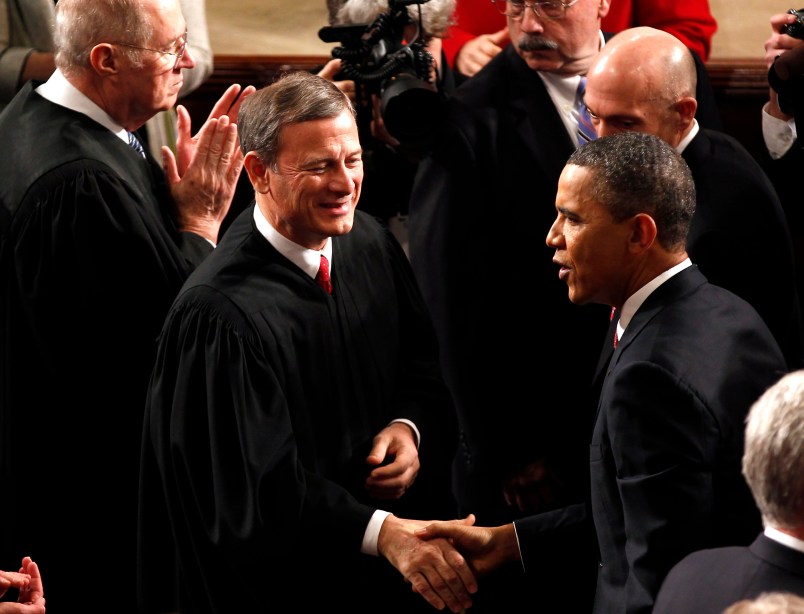Supreme Court justices on Monday hammered President Barack Obama’s expansive use of the recess appointment power to sidestep Senate Republican obstructionism and temporarily staff government agencies. A ruling against the president would substantially alter the balance of power between the executive and legislative branches.
The justices broadly voiced strong skepticism that recess appointments during pro forma sessions — when the Senate technically gavels in and out of session but doesn’t conduct business — were constitutional as they did not technically constitute the “recess” to which the Constitution refers.
Justice Antonin Scalia, as he often does, led the charge against the Obama administration’s position. He argued that the president’s use of the recess appointments to fill empty slots on the National Labor Relations Board “flatly contradicts the clear text of the Constitution.” When U.S. Solicitor General Donald Verrilli defended the decision by saying the Constitution is ambiguous on that question, Scalia retorted, “It’s been assumed to be ambiguous by self-interested presidents,” to gasps and laughs in the chamber.
The Senate, argued Chief Justice John Roberts, has “an absolute right not to confirm nominees that the president submits.”
Even Obama-appointed Justices Elena Kagan and Sonia Sotomayor did not appear convinced that pro forma sessions were fair game for recess appointments, observing that the Senate technically comes into session and does not declare itself to be in recess.
“It really is the Senate’s job to determine whether they’re in recess or whether they’re not,” said Kagan.
Several justices, most notably Stephen Breyer, wrestled with the practical implications of curtailing the recess-appointment power on the government’s ability to function, wondering what options a president would have if the Senate simply refused to confirm nominees to important agencies tasked with carrying out the law.
Justice Ruth Bader Ginsburg, the leader of the court’s liberal wing, attempted to reconcile the textual contradiction with the historical changes in the way Congress uses recesses. In the early days, the Congress used to recess for up to six or nine months because members had to travel far, whereas today it can be called back into session at the drop of a hat.
“On the wording, the [administration’s] case is not strong,” said Ginsburg.
Verrilli called the recess-appointment power a “safety valve” for presidents to staff government agencies when the Senate couldn’t confirm nominees.
It was less clear where the justices came down on the other two questions presented to the court, apart from the pro forma issue. One was whether a recess appointment could be made during a recess within an annual session of the Senate, or whether it was restricted to recess between sessions. The other was whether the president could fill vacancies that already existed during a recess, or whether the vacancies had to arise during the recess. A broad ruling in favor of Noel Canning, the business that sued to block NLRB decisions made by appointees put in place during pro forma sessions, would radically diminish the administration’s recess-appointment power.
Presidents since the founding of the United States have exercised their power to make recess appointments in different ways, but the courts have not comprehensively addressed the parameters of that power because it was hardly in dispute until Obama invoked it. The justices indicated that they didn’t want to implicate decades — or more — of prior government actions made by recess appointees if they decide to curtail the practice.
When Roberts asked Verrilli if the administration believes a ruling against it should implicate recess appointments made by presidents dating back to George Washington, Verrilli said no.
Scalia soon chimed in: “You don’t really think we’re going to go back and rip out every decision made.”
If the Obama administration loses the case, the immediate implications are somewhat less significant than they were when the case began because the majority Senate Democrats recently eliminated the 60-vote threshold for most nominations, drastically limiting the Senate minority’s power to block presidential nominees. But the long-term constitutional questions are profound: An unfavorable ruling would restrict the president’s ability to make government function in the face of a hostile Senate.
Senate Minority Leader Mitch McConnell (R-KY) was present for the argument. His — and every other Republican senator’s — argument for restricting the president’s recess-appointment power was heard for 15 minutes during the 90-minute oral argument. It was made by lawyer Miguel Estrada — whose own nomination to the D.C. Circuit of Appeals by President George W. Bush was successfully blocked by the then-minority Senate Democrats — who argued that Obama was seeking to end-run the Senate’s advice-and-consent duty.
A decision in the case, NLRB v. Noel Canning, is expected by the end of June.






